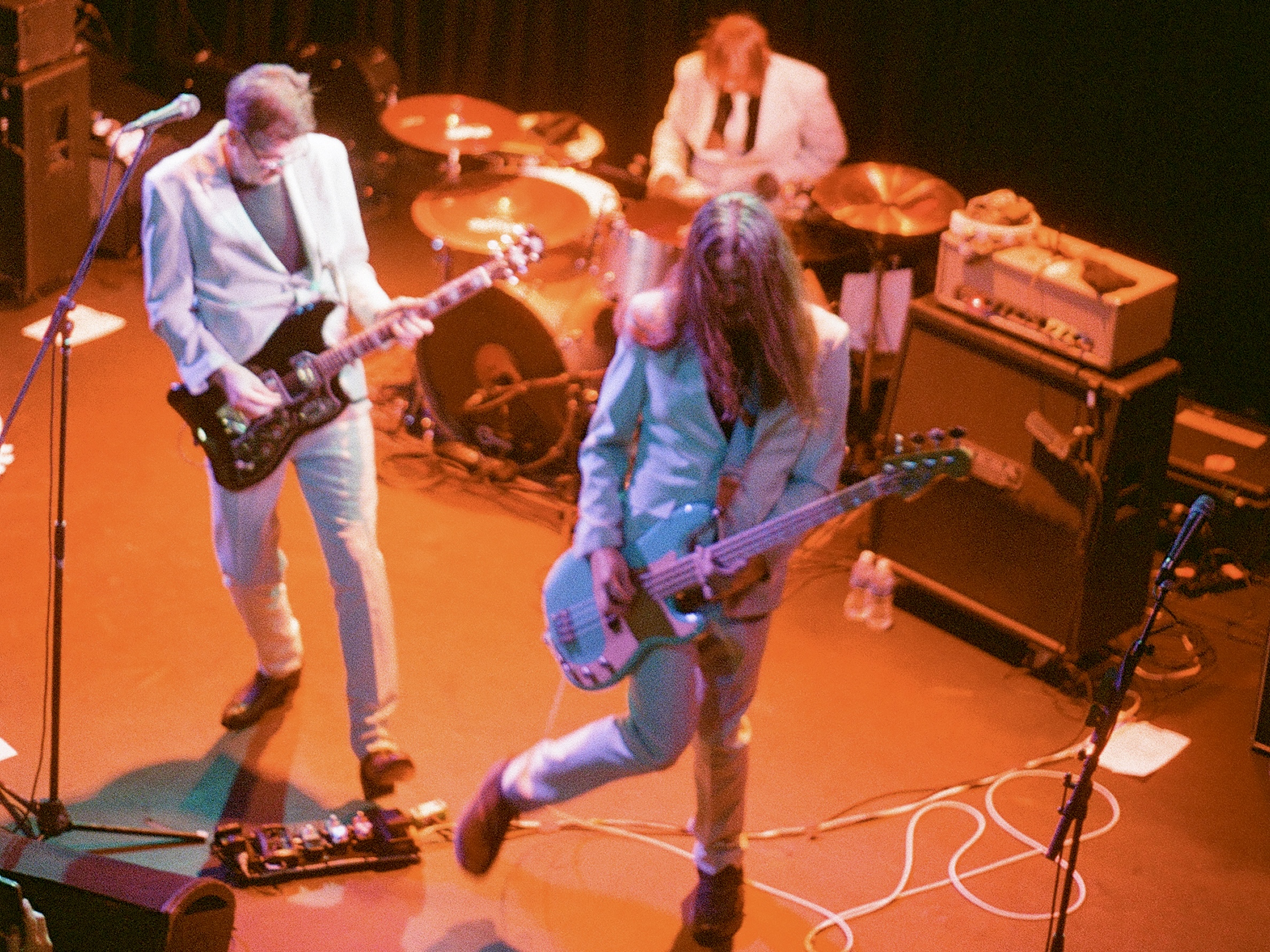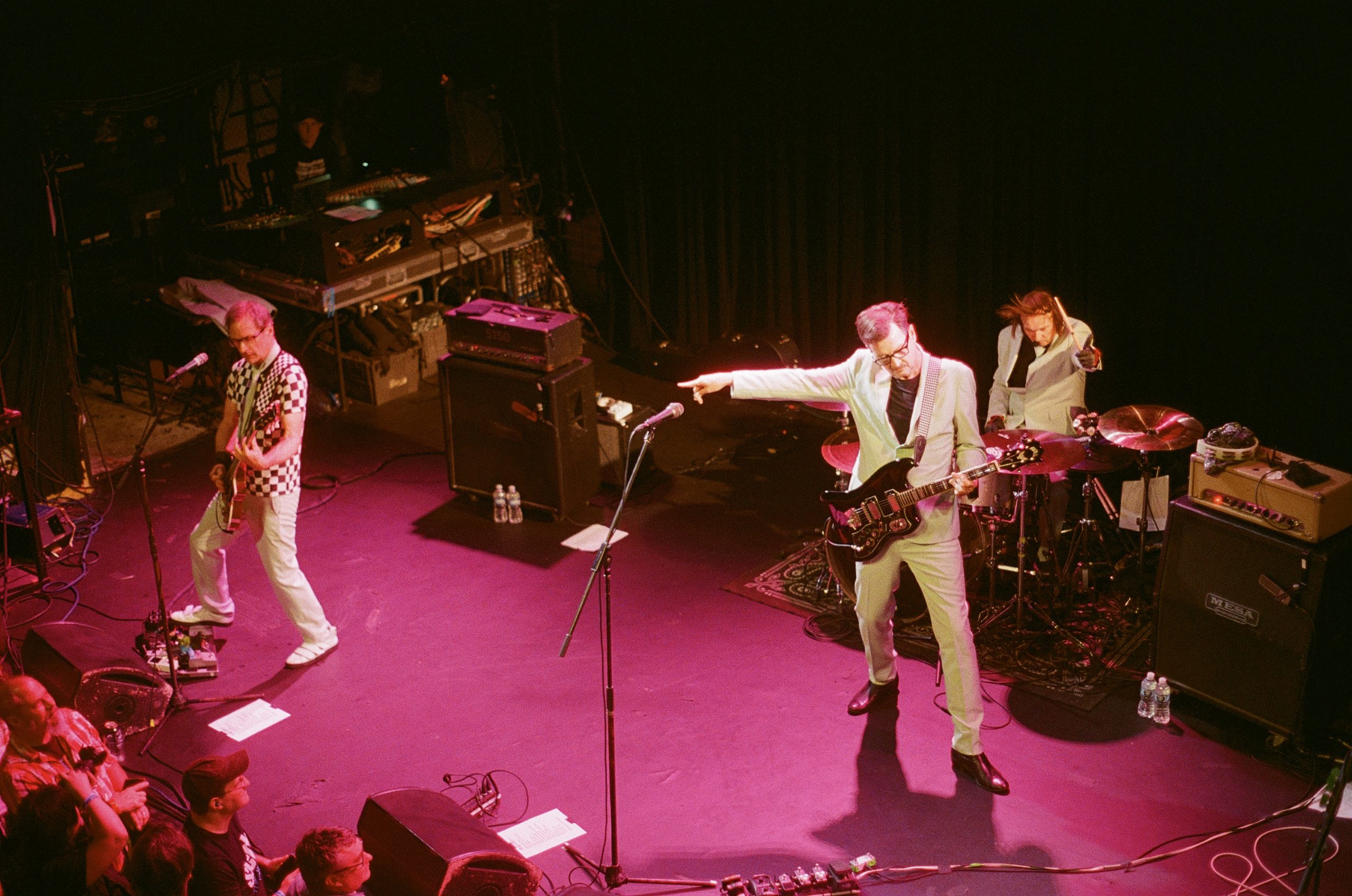Brothers Jeff and Steve McDonald have truly seen it all. After starting their band as kids in Hawthorne, California (Jeff was fifteen and Steve was eleven, to be exact), they played their first public performance at an eighth grade graduation party with Black Flag, broke up and reformed a handful of times, starred in underground films directed by the likes of David Markey and Lucas Reiner, got Sofia Coppola to pose naked on the cover of their 1990 album ‘Third Eye,’ and to this day have eleven albums under their belt. They’re perhaps among the youngest rock stars who can say they’ve been making music professionally for forty five years and counting.
In June, they put out their latest effort, a self-titled double album dubbed “The Redd Album,” which pays homage to The Beatles’ “White Album.” The band recently graced the stage at Brooklyn’s Music Hall of Williamsburg and we sat down before their show to discuss their new music and their history in punk rock.
Note: This interview has been edited and condensed for clarity.

Can you tell me your name and what you do in Redd Kross?
Jeff: I’m Jeff McDonald, I’m one of the main singers and guitarists.
Steve: I’m Steve McDonald and I’m the little brother in Redd Kross.
Throughout your career you’ve had a very eclectic fashion sense and wardrobe. Not just for your performances but also on album covers like ‘Third Eye’ and the reissue of ‘Teen Babes from Monsanto.’ How do clothes and costumes play into your creative practice? And what’s your favorite thing you’ve ever worn on an album cover or for a tour?
S: Well it’s funny that you should be asking us this tonight because tonight we have a major wardrobe change. Not a change during the performance, but we’ve been wearing a particular wardrobe on tour, and tonight we’re switching it up and wearing our other wardrobe. So, there’s a little bit of anxiety about things–
J: But we’ve always been heavily into clothes and fashion because the punk rock scene we came from was very…there were lots of rules in punk about fashion and what you were allowed to wear. So, it was really fun for us to troll all of our peers by being glamorous, not in the Poison sense, but just by finding insane clothes to wear. And one of my favorite outfits, as you’ve mentioned, the reissue of Teen Babes from Monsanto–Steven had purchased a really cheap, ragged, blue Sgt. Pepper jacket that at one point he would wear but then I ended up with it but by the time I wore it on the cover, one of the sleeves was missing. That’s how we would go. If it looked cool, who cared?
S: We used to dive into the Goodwill drop off bin at the supermarket after gigs at two o’clock in the morning. That was sort of like our after party, but that was the early eighties.
J: So we still got good seventies stuff.
S: Yeah we would find all of these rare finds from ten, fifteen years earlier like patchwork bell bottoms–
J: Your huge elephant flare patchwork pants that no one was wearing! But when you’re that age you look great in everything. We were smart enough to know that somehow.
S: So, gigantic patchwork bell bottoms were, at that point, completely subversive in the environment that we were in. But yeah, we’ve always kind of had a kind of mix-and-match, intuitive fashion sense, I think.
You say that you changed from what you were wearing, you’ve been rocking the “Candy Coloured Catastrophe” outfit–
S: Yeah we’ve been wearing that on tour, but tonight we’re wearing an outfit from another video. Which, I don’t know if you want spoilers but, this is sort of a monochromatic look.
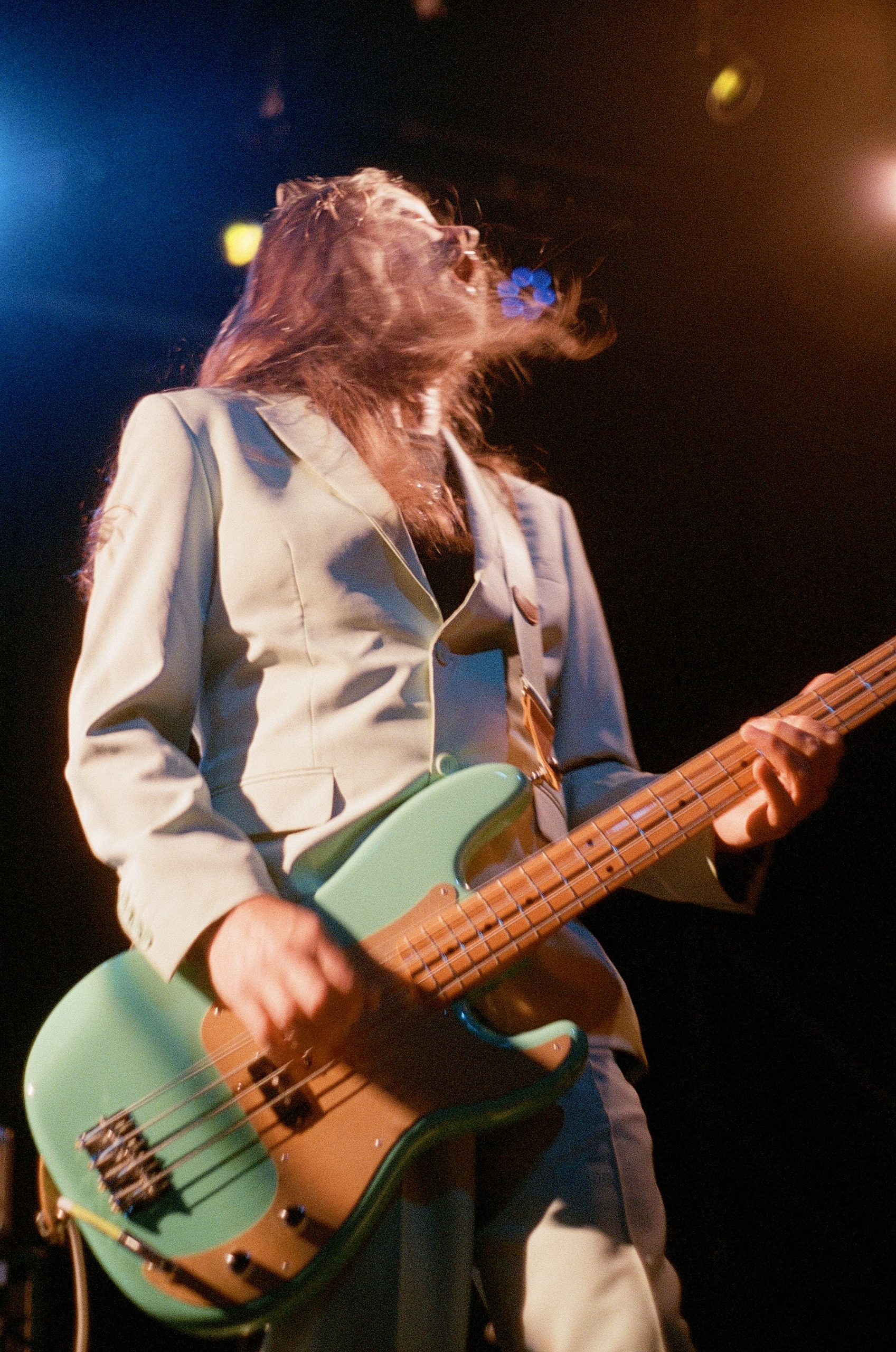
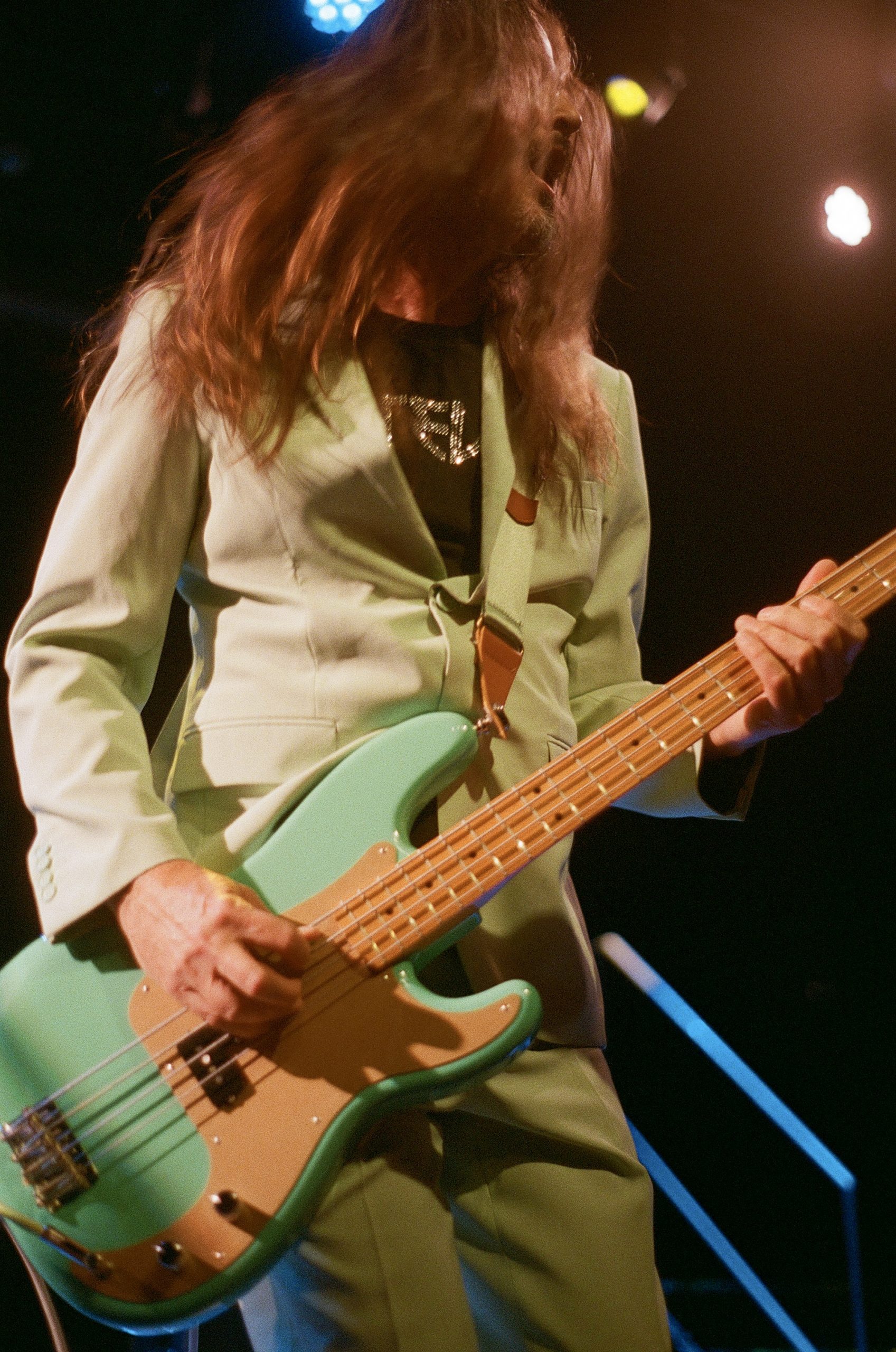
Speaking of “Candy Coloured Catastrophe,” I wanted to ask about your new album–was The Beatles homage something you had in mind from the beginning, or did that come afterwards?
S: The way that came together was, I think that Jeff and I both secretly had that idea, but neither of us were saying it to each other. It was kind of this unspoken thing. Jeff had said, I’m imagining something textural like terry cloth. Then I got every red towel I could find. And then I had this idea of embroidery. Him and I weren’t explicitly talking about the homage that came about, but I think we were both aiming in that direction. Jeff expressed it in the sense where he said “I want the back cover to be completely plain.” And I had forgotten that the White Album’s back cover was bare and at first I pushed back on that and then I realized “Oh, I think I know what he’s talking about.” But it was like that. Nothing was explicit, it wasn’t calculated like that, it just kind of came out that way. On the inside cover there’s also an homage, on the gatefold, but it’s even more obscure– it’s like the back cover of the John Lennon solo album.
J: And Yoko’s!
S: Yes. So John and Yoko, on the back cover of their records, have childhood photos. So we decided to be John and Yoko on the inside of our record. And in fact, we even put a special grain filter over the images so that it would look like they’re photos from the 1940s, even though our photos are from the 1960s.
J: Yeah, it’s a Depression era look.
The last song on the album “Born Innocent,” is sort of an autobiographical look at your career so far. ‘Born Innocent’ is also my favorite of all your albums! Do you have any favorite memories or stories from the creation of that record– specifically anything in regards to the song “I’m Alright,” because I think that’s one of your most underrated.
S: “I’m Alright” is actually a cover tune.
J: It’s actually a Bo Diddley song!
S: Right! Okay, so we know it as a Rolling Stones song because they were doing it around ‘64 or ‘65 and we fell in love with a live performance that we found on VHS video in the 80s and we used to watch it a lot. So, that record was definitely informed by our obsession with very early Rolling Stones and “I’m Alright” would be the most obvious example of that. But there’s all sorts of things. There was a lot of change going on in our lives around the time of that record. I was fourteen, Jeff was seventeen or eighteen.
J: It was recorded in a really obscure suburb of Los Angeles. The studio was a pro studio but it was in someone’s guest house and it was just weird. We were really isolated in suburbia and it kind of fit perfectly with what we were doing.
S: It was recorded in Simi Valley and the neighborhood looked like the neighborhood in E.T.
J: Like when they’re trick-or-treating in the daytime.
S: So, imagine that kind of snotty, teenage angst being expressed in E.T.’s neighborhood.
J: And we essentially recorded it all in a garage… but yeah, it was very of its environment. I think Born Innocent is my favorite too because it sounds exactly the way we sounded then. That’s what I like from it, that’s the experience that I get. It’s a fun snapshot. I don’t know that I have a favorite record, but I really do like it.
You’ve got a documentary out now that’s also called Born Innocent. What were your initial reactions when you were approached about the making of a Redd Kross film? What do you think your teenage selves would have thought about the existence of a documentary about your band?
S: I would guess that Jeff’s teenage self would assume–
J: I would’ve been way into it.
S: Jeff would have just assumed “of course that’s going to happen, it’s an inevitability.” I certainly wasn’t thinking in those terms. When Andrew Reich, the filmmaker, asked us I probably had some hesitations just because it’s weird to have your whole story documented. It just seems like we should’ve been older or something too.
J: It also kind of infringes on your privacy!
S: There’s that too! It’s like, for instance, Drew Barrymore wrote an autobiography at I think fourteen?
J: And she has yet to write the sequel!
S: But yeah, luckily the film–have you had the opportunity to see it?
I have! When it premiered in New York. I actually had tickets to go to a show the same night but I blew it off so that I could watch it because it was the only day it was playing, I think.
S: Yeah, it’s still not really “out” yet. It’s still playing in random festival circuits.
Something I noticed was left out of the film was your involvement with Desperate Teenage Lovedolls. How did you both come to be actors in the film and also make the soundtrack?
S: Well, we were just friends with some of the other actors and the filmmaker. David Markey and Jennifer Schwartz and Hilary Rubens. We were just kind of hanging out and David Markey had a Super 8 camera. He had this loose idea about making a film about the meteoric rise of an all female rock group. We were big fans of the Runaways–
J: And Russ Meyer’s films and John Waters and Brady Bunch–
S: And 70s sketch comedy like 70s SNL, things like that. It was just all very collaborative and improvised–which maybe you can tell.
J: What’s amazing about that film, about both films, David’s camera, it was not only a Super 8 camera, it was plastic! And it had a plastic microphone. It was as cheap as you could get. And then all the film was processed at a local drug store.
S: Didn’t they get flagged?
J: No, there’s no–
S: There are some disturbing moments!
J: [laughs] Yeah there is!… But those are like our childhood home movies, those films. Well, it’s our teen home movies.
S: It’s insane though Jeff and I just saw it for the first time in decades. We went to a screening of the film at USC film school… Who’s hall was it at?
J: Francis Coppola and what’s his face… Star Wars guy. Those are the people.
S: Oh yeah, the George Lucas theater! Who would have ever imagined that? Now that would have been more surprising to me than the documentary. If someone said this is going to screen someday in the George Lucas theater at USC film school [laughs]–
J: I’m trying to think, say around the time when we made–what year was Born Innocent made?
S: I think it came out in ‘82 but it was made in ‘81?
J: By ‘82 there weren’t–now there’s millions of rock documentaries but then I don’t think there were any. There was just maybe the weird, really poorly done Beatles rock documentary.
S: There were kind of more fake documentaries like The Rutles and Spinal Tap was soon after that.
J: Yeah I don’t know that many rock doc– there were some but it’s not as common as it is now.
S: Oh and the thing about the Love Dolls soundtrack– we didn’t really set out to do the soundtrack. Basically what happened was, when the first movie was made, Desperate Teenage Lovedolls–it was originally entitled Desperate Teenage Runaways. And then on top of it, the girls were lip syncing to Runaways songs.
J: ‘Cause we didn’t have any idea that we were ever going to show these movies to the public.
S: Well, I also don’t think we knew anything about creative license and intellectual properties or anything like that. So we did show the first movie in a nightclub in LA and premiered it as Desperate Teenage Runaways. Then Kim Fowley, the producer of the Runaways, showed up to the screening and he threatened to kick all of our asses and he said that if Joan Jett was there, she would have punched us in the face.
J: No he said that if Joan Jett was there she would have smashed the projector!
S: Oh she would have smashed the projector and then Kim Fowley said something threatening like he had a blow torch in the car. At the time we were like “Oh my god, how lame!” But now looking back, maybe he had a point. But it was also kind of funny that he would claim we were stealing his life story when the character that was most aligned with him was my character Johnny Tremaine, which, I don’t know if I would really want to claim ownership of that character. In fact, when I saw it recently, looking at it through a 2024 lens, I was a little shocked by the fame has a price scene. But you know, it was a different time.
If you could make a soundtrack for any film director in any time period, who would you pick?
J: That’s difficult–
S: Maybe a Russ Meyer movie. That would be so fun to score. He’s just so visually inspiring and all of the performances are super fun.
J: Oh, and any kind of involvement with John Waters would be great because he is a big inspiration.
You guys just played the John Waters festival too, right?
S: Yeah it was our second time! We did it once before in 2017 or something.
J: He did a ten minute stand-up piece on us, it was really an honor!
S: Yeah! He knew all this deep knowledge stuff that was moving to hear. It was really funny, he was saying that we named our band after the crucifixion masturbation scene in The Exorcist. It was ludicrous stuff but it felt like a real win.
J: John Waters was always such a huge inspiration for us. Even before VHS machines, if there wasn’t a show or a band to see, we would go to the midnight showing of Pink Flamingos and we saw it so many times. I had a cassette tape of the movie–
S: Of the audio!
J: Yeah! And then his first book Shock Value was really a how-to for young artists who seriously want to do something, how to do it yourself. It was very inspirational.
S: The spirit in which he made those films was definitely the same spirit in which we started our band and made those movies with David Markey. Kind of like finding other misfits that you identified with. It was harder to do in the pre-internet world, I’m guessing. It was always kind of like a flare or a beacon to say “we’re here, over here!”
J: And it helped that we made records because we’d find people who liked our music so they were into the same stuff that we were into.
S: But John and the island of misfit toys that coalesced around him and Baltimore in the seventies was super impressive.
J: And we came up in a time where if you had an interesting idea, you had to just do it yourself because nothing else was really going on at the time. The same thing with John Waters, they had such weird ideas and no one was going to help them out. You had to learn how to do it yourself, which we still kind of operate that way. We produce our own records and we do a lot of stuff ourselves.
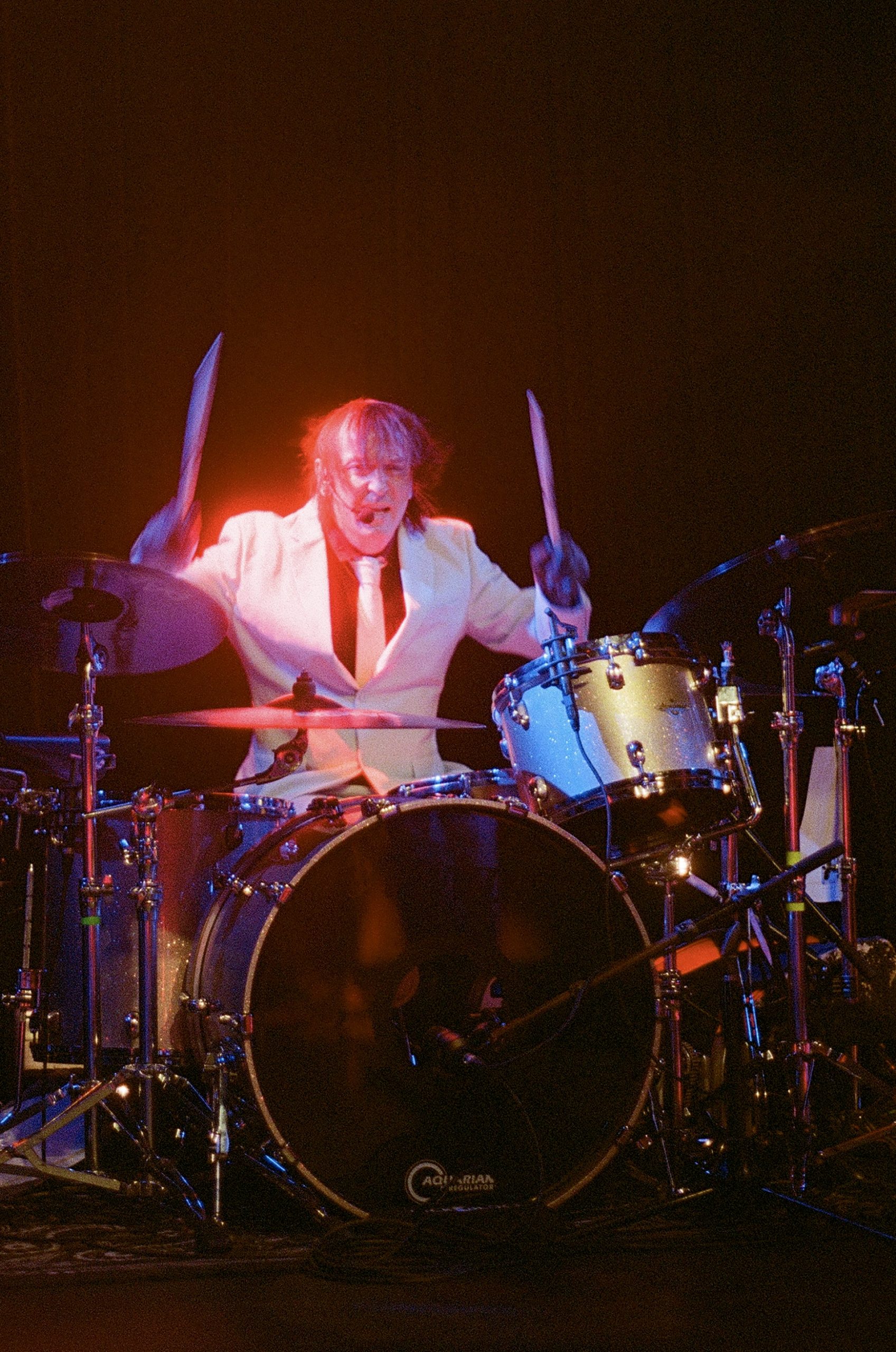
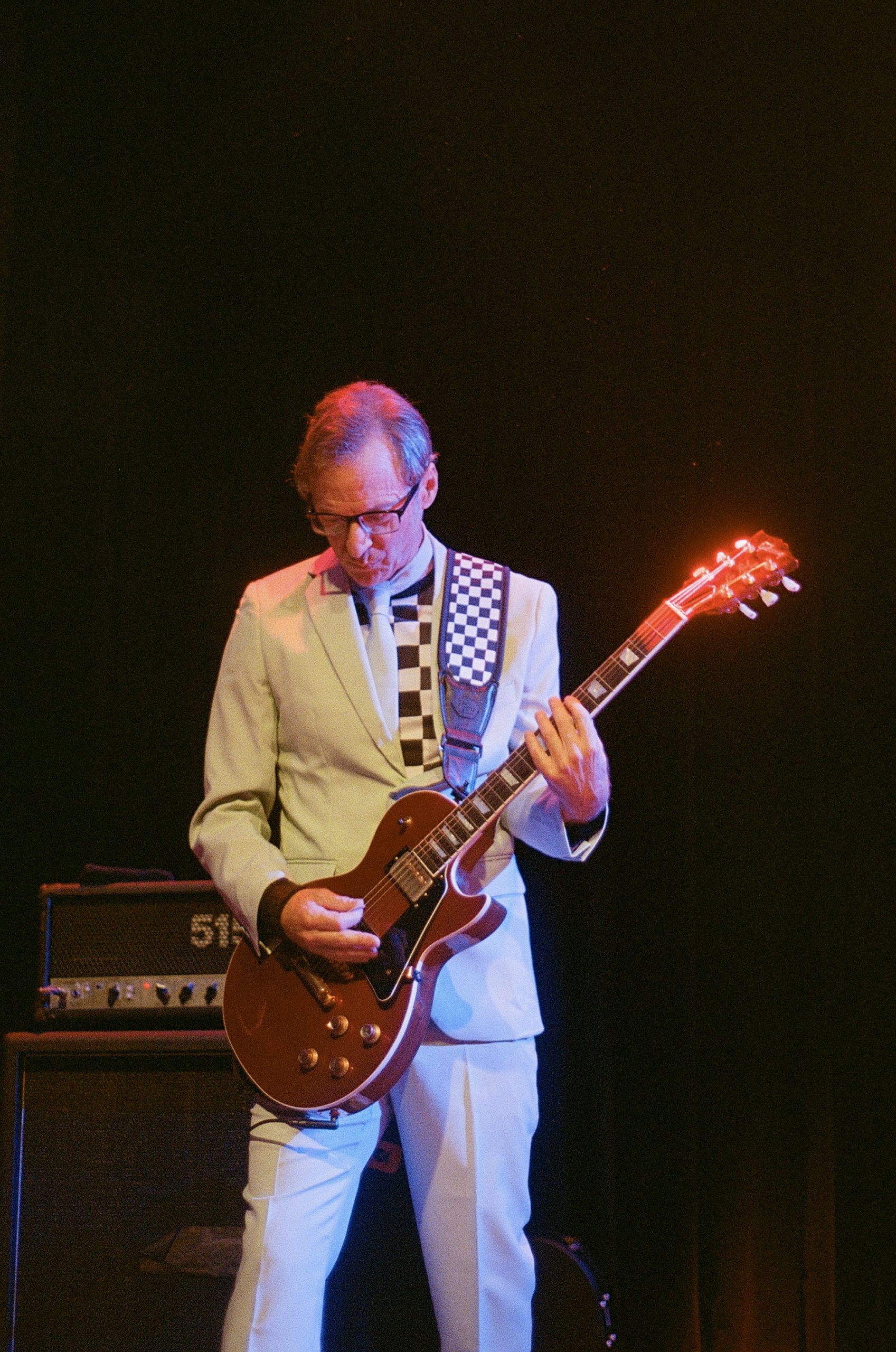
Keeping on the topic of movies, I’ve always wondered why you guys weren’t in The Decline of Western Civilization. What were you doing when that was being filmed?
J: We were watching from behind the camera!
S: Well, I think when Penelope Spheeris really started to film bands, we were on a hiatus of sorts.
J: A lot of the interviews were filmed in our rehearsal room.
S: Yeah ‘cause we were always kind of falling apart and putting it back together from the very beginning.
J: Our drummer had just quit our band in some big dramatic fashion on stage and then he became the lead singer of Black Flag. So, that all happened within a couple of months and that’s when Penelope Spheeris came in.
S: Are Circle Jerks in that movie? I don’t remember.
Yes, right towards the end.
S: Right, so both Black Flag and Circle Jerks were in that film–the singer of Black Flag at that moment had been in Redd Kross as a drummer, and then the guitar player of Circle Jerks had played guitar for Redd Kross. It was just the timing was such that right when those two guys left our band and went off and did those other bands, we were still regrouping. So we were robbed of that glory moment. But, another Penelope Spheeris connection that’s kind of interesting is the film Suburbia, which I’ve actually never seen.
J: There’s a lot of it in our documentary.
S: Yeah because the scenes of the punker kids walking around in the vacant houses sort of depicted what our childhood neighborhood was like, those were actually scenes from Suburbia. Those neighborhoods weren’t our neighborhood but they were the exact same type just about ten miles east of us. ‘Cause there was the freeway project, the 105 freeway, that went right through our neighborhood. So we had a similar experience to some of the kids in that film. But once again, I haven’t seen the movie so I don’t want to say it was that similar other than we just lived in a neighborhood where it was like a forties, fifties tracked home community that was being slowly decimated by a freeway project.
J: It was a mid-century nightmare. But fun for kids.
S: Fun for us. As Jeff calls it that’s where our Huck Finn adventures were.
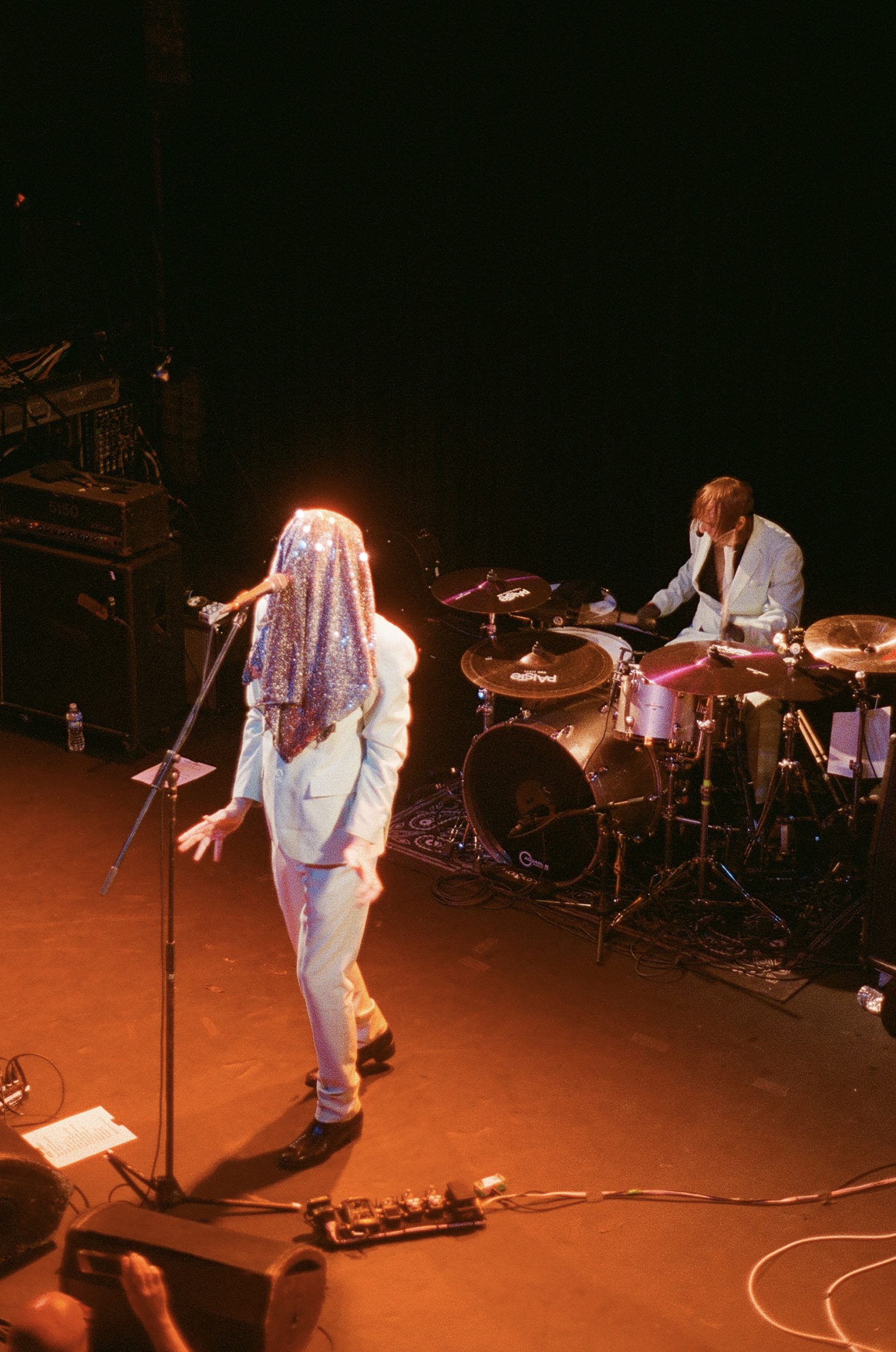
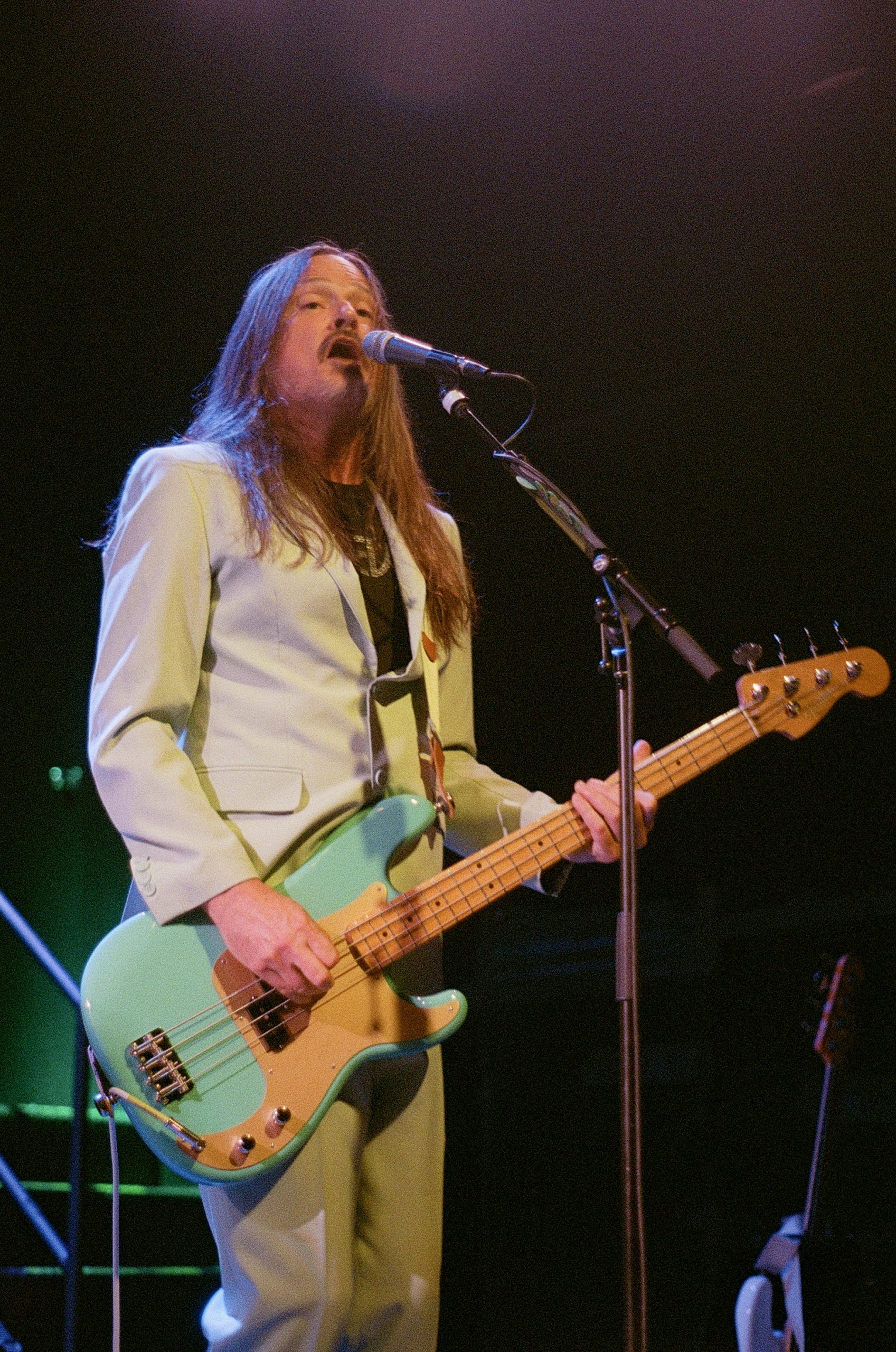
This last one might be tough but, looking back on your entire career, is there anything that you are the most proud of or that has given you the most satisfaction to have made or done?
S: I’m really proud of what we’re doing now, I know that’s a very cheesy Paul Stanley kind of answer. We realized on this tour, or maybe a little bit before, that Jeff and I had been doing this together, playing live and making records for forty five years. I think I’m the first Gen X-er to make that claim, that I’d been in rock for forty five years [laughs]. I guess that’s something to be proud of.
J: We grew up with the Osmond Brothers and seeing little kids on stage and Judy Garland, too, she was another little kid. You can have all of this incredible experience but still not be that ancient.
S: But also I’m still very hungry for it. Maybe it’s foolish but I’m still trying to grow the audience. The same things drive me that drove me when we started the band and I think that is reflected in the new record. The set that we’re doing now is sort of this retrospective of a little bit of everything but it doesn’t feel like nostalgia. Especially because it’s peppered with the new album. It doesn’t feel like everyone is just showing up to remember their high school years. It feels more–
J: Now!
S: Yeah, now, or the future or something. Or at least, that’s what I’m projecting on to it.
J: But the very best thing that I’m most proud of, I think it’s the fact that we can still have interesting experiences. That we haven’t done everything yet. It’s still really exciting to get on an airplane and go somewhere. We haven’t won a Grammy yet, though. The funny thing about the Grammy’s is, you know they have those alternative categories that they don’t show on TV. These people are always getting Grammy awards that you’ve never heard of and we found out that to get nominated, it requires about 20,000 dollars cash and you have to send out gifts to all these people, so, we’re not going to win our Grammy.
S: Unless we do it our own way…but once again, robbed! So kids, when your whole family gathers around the TV this year for your annual ritual of watching the Grammy’s, know that Redd Kross were robbed because they weren’t willing to cough up the cash.
